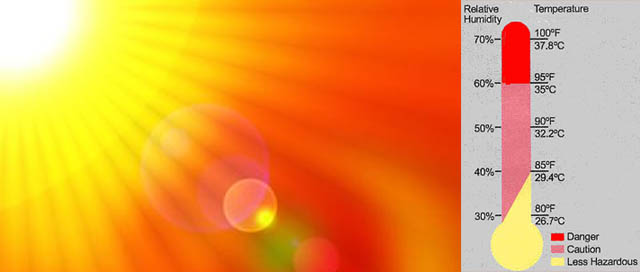Heat Exhaustion And Heat Stroke
Heat stress is the buildup in the body of heat generated by,
– your muscles during work, and/or,
– heat coming from a hot environment.
Heat exhaustion and eventually even heat stroke will result when the body is subjected to more heat than it can cope with…
When the body becomes overheated, less blood goes to the muscles, brain, and other internal organs.
You become…
– weaker
– tired sooner
– less alert
– less able to use good judgment
HEAT EXHAUSTION
Symptoms of heat exhaustion include…
– profuse sweating
– weakness
– nausea
– vomiting
– headache
– light headed
– muscle cramps
As the condition becomes more severe, there can be a rapid rise in body temperature and heart rate. You may not realize that this is happening because there is no pain. Mental performance can be affected with an increase in body temperature of just 2 degrees F above normal. An increase of 5 degrees F can result in serious illness or death.
HEAT STROKE
Heat exhaustion can progress to heat stroke when the body’s temperature regulation fails and spirals out of control. The individual becomes confused, lethargic and may have a seizure, the skin stops sweating and the body temperature may exceed 106 F (41 C ). Its effects can include confusion, irrational behavior, convulsions, coma, and even death. Heat stroke can cause varying degrees of brain and kidney damage. More than 20 percent of people that get heat stroke die, even young and healthy adults.
The body normally generates heat as a result of metabolism, and the body is usually able to dissipate the heat by either radiation of heat through the skin or by evaporation of sweat. However, in extreme heat, high humidity, or vigorous exertion under the sun, the body may not be able to dissipate the heat and the body temperature rises
Those most susceptible to heat strokes are infants, the elderly, athletes, or any outdoor worker physically exerting themselves under the sun.
Prevent heat stroke and Beat the Heat
.
Hydrate. Most importantly, avoid becoming dehydrated. A dehydrated person may not realize that they are dehydrated, and will not be able to sweat fast enough to dissipate heat, which causes the body temperature to rise. Drink plenty of fluids (such as water and Gatorade).
Avoid vigorous physical activities in hot and humid weather (common sense). If you have to perform physical activities in hot weather, take frequent breaks to hydrate yourself.
Wear a hat, and light colored, loose clothes.
Avoid alcohol, coffee, and tea which may lead to dehydration.
Stay low. Heat rises. So the lowest room of the house will be cooler.
Open doors and windows early in the morning to let cool air in. Then as it heats up outside, cover the windows, blinds and curtains, and close windows and doors. Common sense is required here… For example, If it is has risen to 95 degrees outside and the house has only warmed to 84, then if you open the windows… the inside will quickly heat up to the outside temperature. On the other hand if the house has warmed up to 90 degrees and it’s 85 degrees outside, OPEN THE WINDOWS. Makes sense.
Vitalyte Electrolyte Powder Sports Drink Mix
Dunk your head in water or wet washcloth behind your neck. Arms, wrists, and elbows in water will help cool.
Spray bottle water mist, especially in front of fan will evaporate and cool the skin.
Put a metal bowl of ice in front of a fan, and adjust the fan so that the air is blowing over the ice. Or, use one or more 2 liter bottles and fill them mostly full of water, freeze them, then place them in a large bowl (to catch dripping water). Position a fan to blow on them.
Don’t use the stove or oven to eat. Eat cold food, or use the microwave. Incandescent light bulbs also create heat.
Soak a t-shirt in the sink, wring it out and put it on. Sit in a lawn chair (or other chair that lets air through to you) in front of a fan. Re-wet as it dries. Use lukewarm water for this so you don’t “shock” your system with cold water.
Soak your feet in a bucket of cold water. The body radiates heat from the hands, feet, face and ears, so cooling any of these will efficiently cool the body.
Sit still. Simply rest until the evening.
If all else fails… go to the mall, library, church, movie theater or some other air-conditioned public building.

